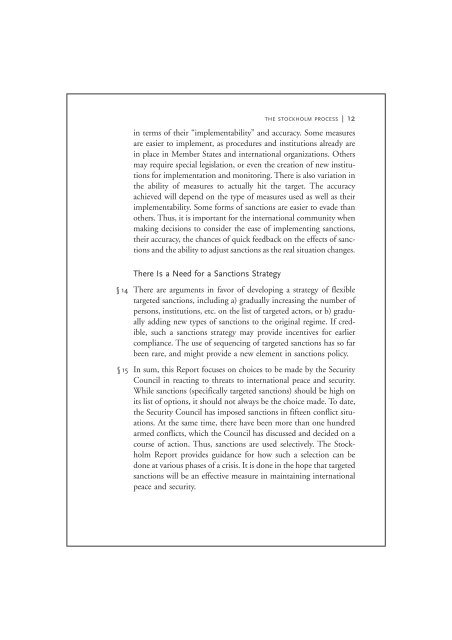Making Targeted Sanctions Effective - Small Arms Survey
Making Targeted Sanctions Effective - Small Arms Survey
Making Targeted Sanctions Effective - Small Arms Survey
You also want an ePaper? Increase the reach of your titles
YUMPU automatically turns print PDFs into web optimized ePapers that Google loves.
§ 14<br />
§ 15<br />
THE STOCKHOLM PROCESS | 12<br />
in terms of their “implementability” and accuracy. Some measures<br />
are easier to implement, as procedures and institutions already are<br />
in place in Member States and international organizations. Others<br />
may require special legislation, or even the creation of new institutions<br />
for implementation and monitoring. There is also variation in<br />
the ability of measures to actually hit the target. The accuracy<br />
achieved will depend on the type of measures used as well as their<br />
implementability. Some forms of sanctions are easier to evade than<br />
others. Thus, it is important for the international community when<br />
making decisions to consider the ease of implementing sanctions,<br />
their accuracy, the chances of quick feedback on the effects of sanctions<br />
and the ability to adjust sanctions as the real situation changes.<br />
There Is a Need for a <strong>Sanctions</strong> Strategy<br />
There are arguments in favor of developing a strategy of flexible<br />
targeted sanctions, including a) gradually increasing the number of<br />
persons, institutions, etc. on the list of targeted actors, or b) gradually<br />
adding new types of sanctions to the original regime. If credible,<br />
such a sanctions strategy may provide incentives for earlier<br />
compliance. The use of sequencing of targeted sanctions has so far<br />
been rare, and might provide a new element in sanctions policy.<br />
In sum, this Report focuses on choices to be made by the Security<br />
Council in reacting to threats to international peace and security.<br />
While sanctions (specifically targeted sanctions) should be high on<br />
its list of options, it should not always be the choice made. To date,<br />
the Security Council has imposed sanctions in fifteen conflict situations.<br />
At the same time, there have been more than one hundred<br />
armed conflicts, which the Council has discussed and decided on a<br />
course of action. Thus, sanctions are used selectively. The Stockholm<br />
Report provides guidance for how such a selection can be<br />
done at various phases of a crisis. It is done in the hope that targeted<br />
sanctions will be an effective measure in maintaining international<br />
peace and security.
















